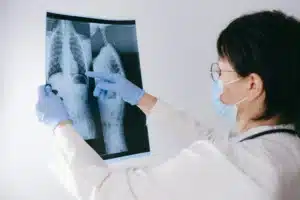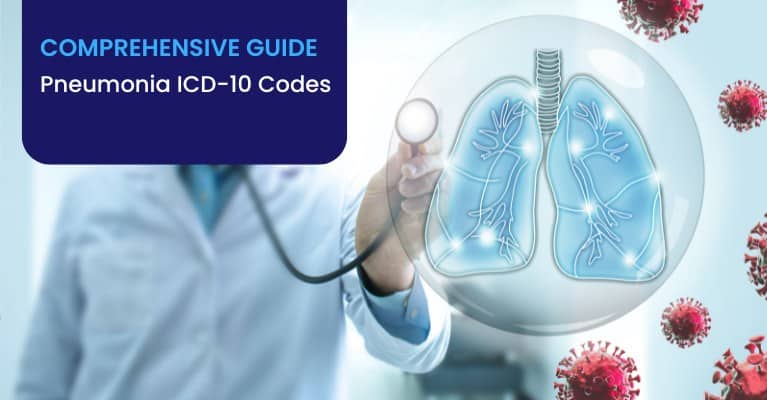
Menu

Coding for the correct Pneumonia ICD-10 Codes is challenging for healthcare providers.
Pneumonia is a major health concern, and coding for it can be complex due to the different causes and types.
According to the Centers for Disease Control and Prevention (CDC), pneumonia results in over 1 million hospitalizations and approximately 50,000 deaths annually in the United States, underscoring the importance of precise documentation and coding.
Today I will break down the most commonly used ICD-10 codes for pneumonia, including specific codes for types like community-acquired and bilateral pneumonia. These codes are the most challenging ones for the healthcare professional. This guideline offers practical insights to help you understand and boost your billing processes, ensuring healthcare professionals understand the complexities of pneumonia coding efficiently.
Pneumonia ICD-10 codes cover various types of pneumonia and their causes. This section explains these codes for pneumonia and their applications.
ICD-10 codes for pneumonia include different classifications based on the cause and type of infection. The most commonly used codes are:
| ICD 10 Code | Description |
| J18.9 | Pneumonia, unspecified organism |
| J18.1 | Lobar pneumonia, unspecified organism |
| J18.0 | Bronchopneumonia, unspecified organism |
| J12.0 | Adenoviral pneumonia |
| J12.1 | Respiratory syncytial virus pneumonia |
| J12.2 | Parainfluenza virus pneumonia |
| J12.3 | Human metapneumovirus pneumonia |
| J12.8 | Other viral pneumonia |
Modifiers provide additional details about the services, ensuring accurate billing and documentation. Following are the common modifiers for pneumonia ICD-10 codes.
| Modifier | Description |
| 25 | Significant, separately identifiable evaluation and management service by the same physician or other qualified health care professional on the same day of the procedure or other service. |
| 59 | It indicates that a procedure or service was distinct or independent from other services performed on the same day. |
| 76 | Repeat procedure or service by the same physician or other qualified health care professional. |
| 77 | Repeat the procedure by another physician or other qualified health care professional. |
| 78 | Unplanned return to the operating/procedure room by the same physician or other qualified health care professional following the initial procedure for a related procedure during the postoperative period. |
| 95 | Synchronous telemedicine service is rendered via a real-time interactive audio and video telecommunications system. |
| GT | Interactive audio and video telecommunication systems. |
| XE | A separate encounter is a distinct service because it occurred during an encounter. |
| XS | A separate structure is distinct because it was performed on a separate organ/structure. |
| XP | A Separate practitioner is a distinct service because it is performed by a different practitioner. |
| XU | An unusual non-overlapping service is the use of a service that is distinct because it does not overlap the usual components of the main service. |
Pneumonia ICD-10 codes vary based on the type and origin of the infection. This section outlines the codes for different types of pneumonia.
Community-acquired pneumonia is typically acquired outside of hospital settings.
Healthcare-associated pneumonia is acquired in healthcare settings other than hospitals.
Hospital-acquired pneumonia develops during a hospital stay.
Ventilator-associated pneumonia occurs in patients using ventilators.
This section details ICD-10 codes for specific pneumonia conditions to ensure precise documentation.
| Pneumonia Type | ICD-10 Code | Description |
| Bilateral Pneumonia | J18.0 or J18.9 | They are used for pneumonia affecting both lungs, indicating a more severe infection. |
| Cavitary Pneumonia | Appropriate codes based on the specific cause | It is characterized by the presence of cavities in the lung tissue, requiring accurate documentation for treatment. |
| Post Obstructive Pneumonia | Requires documentation of the cause of obstruction | It develops when an airway obstruction leads to infection, needing precise coding for the underlying cause and treatment. |
Accurate coding for recurrent and atypical pneumonia is crucial for patient records and reimbursement. This section discusses the codes for these specific types of pneumonia.
| Type | ICD-10 Code | Description |
| Recurrent Pneumonia | J18.9 | This code indicates repeated episodes of pneumonia, which may signal underlying health issues requiring further medical investigation and documentation. |
| Atypical Pneumonia | J12.9, J16 | J12.9 is used for viral atypical pneumonia, while J16 is for pneumonia due to other infectious organisms. These codes document cases caused by less common pathogens, requiring distinct treatment protocols. |
Accurate coding for pneumonia based on specific lung locations is essential for proper documentation and treatment. This section outlines the ICD-10 codes for pneumonia in different lung areas.
Right upper lobe pneumonia affects the upper part of the right lung and requires specific coding for accurate documentation.
Multifocal pneumonia affects multiple areas within the lungs, and precise coding is crucial for documenting the extent of the infection.
Accurate coding for pneumonia using ICD-10 codes is essential for proper medical billing and patient care. Understanding the specific codes for different types of pneumonia, such as community-acquired, healthcare-associated, hospital-acquired, and ventilator-associated pneumonia, ensures precise documentation and optimal reimbursement. It also helps to recognize the importance of specific conditions like bilateral, cavitary, post-obstructive, recurrent, and atypical pneumonia. Following these guidelines, healthcare providers can enhance their coding practices and contribute to better patient care.
Cavitary pneumonia requires specific ICD-10 codes based on the documented cause, ensuring proper treatment and reimbursement.
Recurrent pneumonia should be coded as J18.9 with additional notes to document its recurrence accurately.



